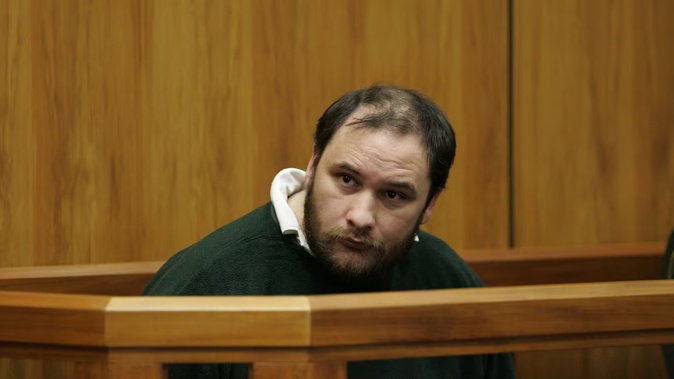
WARNING: DISTRESSING CONTENT
A man who laughed as he repeatedly ran over a young Christchurch sex worker he’d raped, before throwing her half-naked, bound and gagged body in the Avon River has been refused parole.
Peter Steven Waihape has been in prison since 2006 but the Parole Board say he is still too dangerous to release into the community.
He has barely done any rehabilitation behind bars and the risk of him reoffending remains high.
On December 15, 2005, Waihape chanced upon the 24-year-old mother-of-one in central Christchurch.
Her name was permanently suppressed to protect the privacy and safety of her child and family.
She was a sex worker and agreed to go with Waihape. He drove her to a carpark, and an argument ensued over his refusal to use a condom.
Waihape, then 28, partially strangled her, removed her clothing, bound her hands and raped her.
He then pushed her out of the car and ran over her.
She became trapped under the car and was pleading for her life.
Waihape took no notice and ran her over again - witnesses reporting he was laughing as he did so.
He then got out of the car and kicked the badly injured woman at least twice.
“She managed to free herself and sat up. She pleaded for her life. Then you drove at her a number of times, smashing through a concrete wall,” said Justice Lester Chisholm at Waihape’s sentencing.

Peter Steven Waihape. Photo / Supplied
Waihape later drove the woman to the river and threw her half-naked body into the water.
“The ultimate indignity was that you used her as a stepping platform to get out of the river. It couldn’t get much worse,” the judge said.
Just three days before the murder, Waihape abducted and sexually violated a teenager.
She was walking home when he grabbed her off the street and drove off with her.
He bound her hands in the same way as the 24-year-old victim.
He drove the teenager around the city for several hours, violated her and dropped her off on a darkened street.
In the period between the two attacks, Waihape approached Christchurch mental health providers and spoke about what he had done, raising speculation that the killing could have been prevented.
However, Justice Chishom dispelled that notion.
“The information I have read does not lead me to the conclusion that any professional should bear responsibility for the shocking events that were to follow,” he said.
He sentenced Waihape to life in prison with a minimum non-parole period of 18 years for the rape and murder of the 24-year-old.
He also imposed an indefinite sentence of preventive detention.
Waihape was also sentenced to 10 years’ imprisonment for the abduction and sexual violation of a teenager just three days before the killing.
“It is dangerous to speculate you will not offend again in the future,” said Justice Chisholm.
It was revealed at sentencing that Waihape had prior convictions spanning five pages.

Waihape was jailed in 2005 and is not safe enough to release.
The recidivist criminal became eligible for parole this year and first appeared before the board on January 25.
Board chairman Sir Ron Young said while Waihape “seems to behave well” in prison there were “a number of serious concerns” about him.
“He began treatment in 2014 but withdrew his consent after seven sessions. At that stage, he was aggressive although not directly towards the psychologist. He has had no treatment since that time,” said Sir Ron.
Waihape remained in the segregated part of the prison and a psychologist advised he needed “major group-based programmes”, including adult sex offender and stopping violence treatment.
“He indicated that he understood that he would have significant rehabilitative work to do and that until he could complete that work and have testing on reintegration, he could not be released.”
Sir Ron stood Waihape down for six months, ordering a new report on his “situation” to be provided to the board before the next hearing.
“In the meantime, he remains an undue risk,” he said.
Waihape saw the Parole Board again on July 11.
His lawyer said he had “accepted that a future outside of prison would require a change in his approach”.
“He had accordingly instructed counsel that he was willing to resume work on an individual basis with a psychologist and to complete any programme available in the voluntary protective custody environment,” said panel convenor Neville Trendle.
“For his part, Mr Waihape told us that when he was previously seen by the psychologist, he was not ready to engage. He was very entitled. He reacted inappropriately and he had recognised that since.
“He said he had grown considerably since then and reflected on the hindsight he had gained.
“He had addressed his own conduct with others ... He said that he was now accepting that he needed help.”
The board had no option to deny parole for the violent offender.
“Mr Waihape accepted there is work to be done before he is seen by the board again,” Trendle said.
“We will schedule him to return to the board in 12 months.”
Anna Leask is a Christchurch-based reporter who covers national crime and justice. She joined the Herald in 2008 and has worked as a journalist for 18 years with a particular focus on family violence, child abuse, sexual violence, homicides, mental health and youth crime. She writes, hosts and produces the award-winning podcast A Moment In Crime, released monthly on nzherald.co.nz
Take your Radio, Podcasts and Music with you









